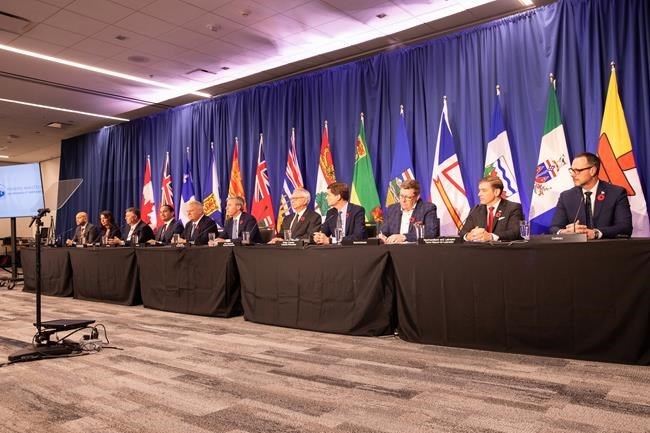OTTAWA — Canada's premiers are warning the federal government not to overreach into their jurisdictions when it comes to delivering the programs laid out in Ottawa's latest budget, but the prime minister said Friday he will go around them if need be.
In a letter responding to the Liberal government's latest budget, the premiers said governments need to "return to a co-operative approach" that respects the needs and priorities of Canadians.
"Every government should have the right to receive ongoing financial compensation representing their fair share," the premiers wrote.
"This includes provinces and territories that reserve the right to require unconditional federal funding."
In the letter, Council of the Federation president and Nova Scotia Premier Tim Houston touched on everything from defence spending and disaster assistance to housing.
The letter said the housing crisis cannot be solved by the federal government working with municipalities alone — an issue that has come up repeatedly in recent weeks as the Liberals have slowly revealed pieces of their housing plan through daily announcements prior to Tuesday's budget.
After one of those announcements, Ontario Premier Doug Ford said he would refuse to accept federal housing money if it meant signing a deal that would force municipalities to allow fourplexes to be built without amending existing bylaws.
On Friday, Trudeau reiterated that he wanted to work with premiers but would find other ways of getting things done if necessary.
"I'm going to work where I can in partnership with provinces that want to, like B.C. and others have," he said.
"And places where they want to block the kinds of investments that are going to help Canadians, I'm just going to try and figure out ways to help Canadians directly as necessary."
In their letter, the premiers say they need to have a key role in developing federal housing programs and are calling for more flexibility.
The government's housing plan includes billions in spending aimed at building nearly 3.9 million homes by 2031.
"Budget 2024 may lead to positive impacts for Canadians if actioned properly and collaboratively with provincial and territorial partners," the premiers wrote.
The premiers also said they worry new federal programs are eventually going to be downloaded onto provinces and territories.
In addition to its national dental care, pharmacare and child-care programs, the federal Liberals have plans to create a national school food program and have introduced funding for the Canada Disability Benefit that will require further discussion with the provinces and territories.
"We have worked tremendously constructively with provinces over the past few years to deliver things that really matter for Canadians," Trudeau said. Some "conservative provinces" have resisted programs like $10-a-day child care, he added.
Houston and his fellow premiers also say they expected updated arrangements for disaster assistance this year to provide adequate support for emergencies, and that they were expecting flexible and predictable infrastructure funding, "but this did not happen."
At a news conference in Winnipeg, Manitoba Premier Wab Kinew said infrastructure funding is his top priority.
"We need the federal government to come forward with their share of investments," he said.
Kinew said federal announcements with predetermined conditions prompt questions "about whether we're going to have the flexibility to meet the needs" and said he believes local decision-making is important.
This report by The Canadian Press was first published April 19, 2024.
Sarah Ritchie, The Canadian Press




